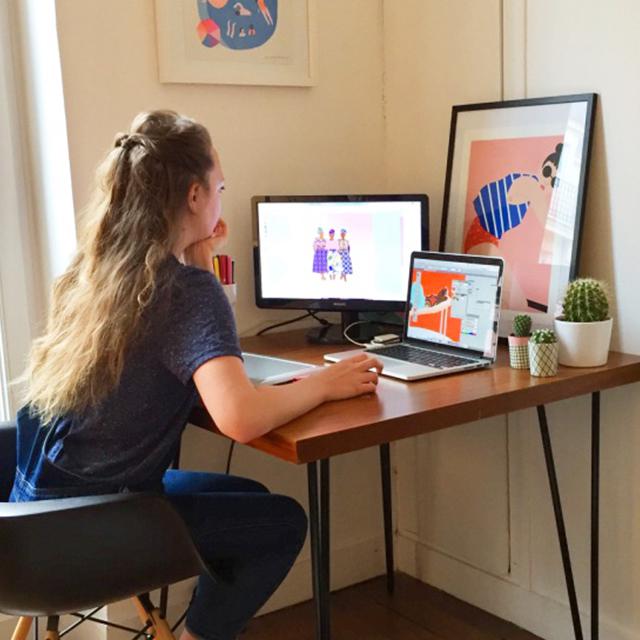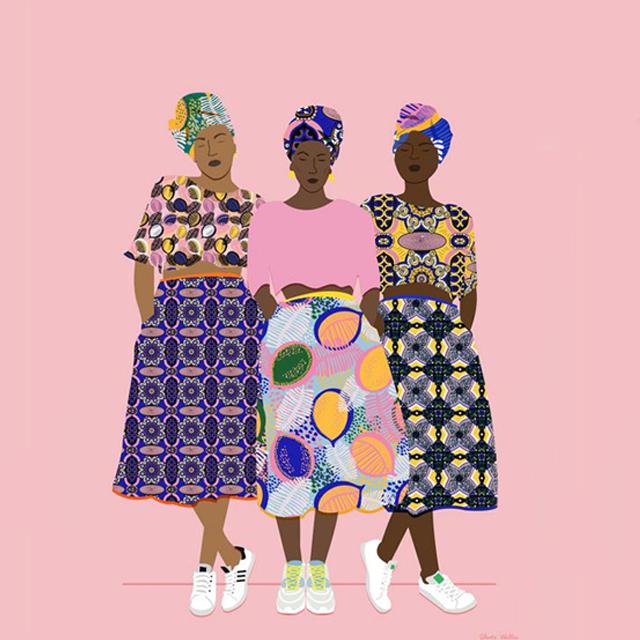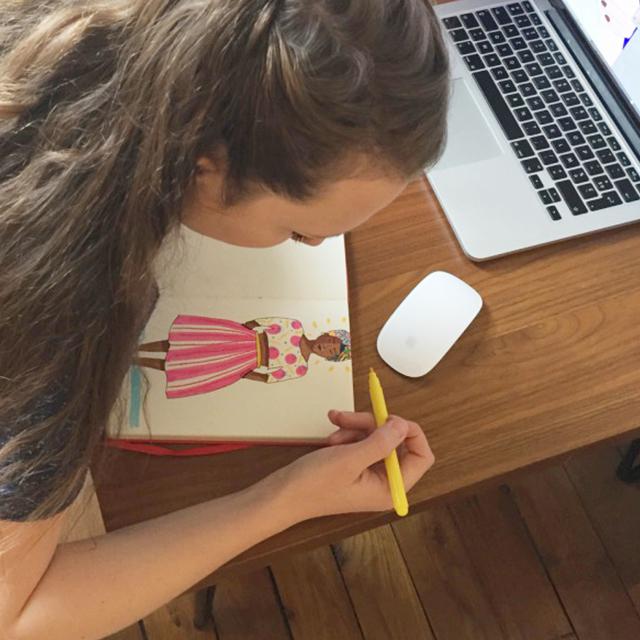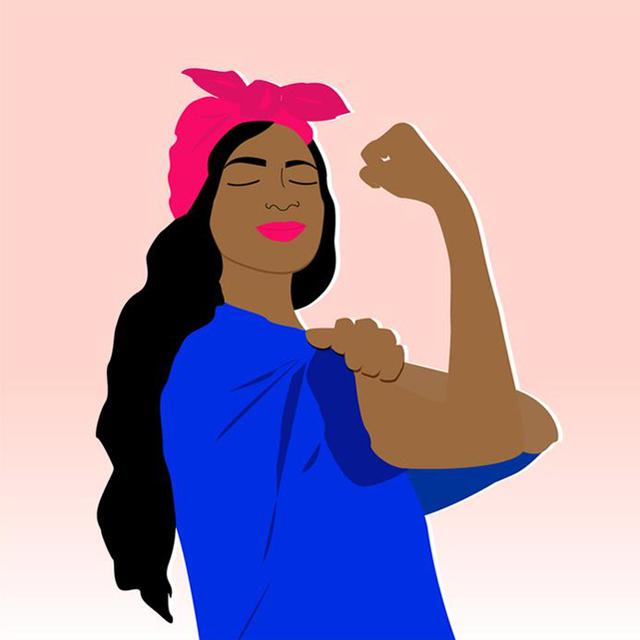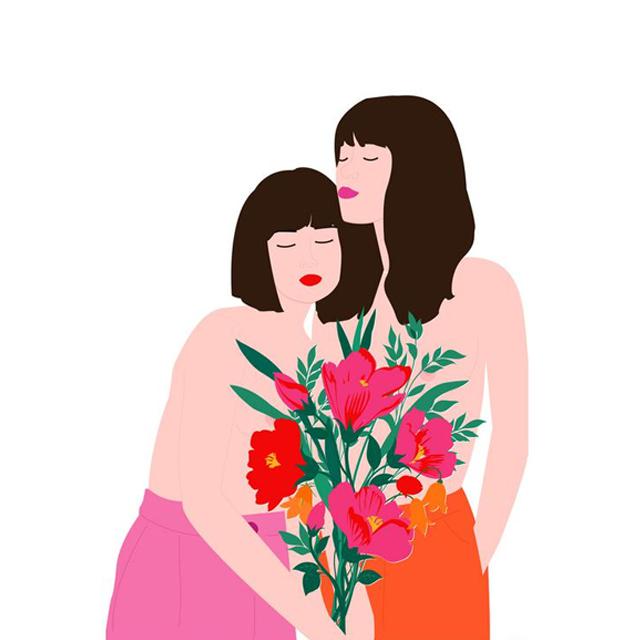Bold, beautiful and bursting with life—Céleste Wallaert's compositions fully embody the spirit of our times. Especially admirable is the way in which her work strikes a sensitive chord, thereby acting as a mirror for our own identities and experiences.
We stepped inside her vibrant world to take a closer look at the values and social constructs that give rise to her illustrations.
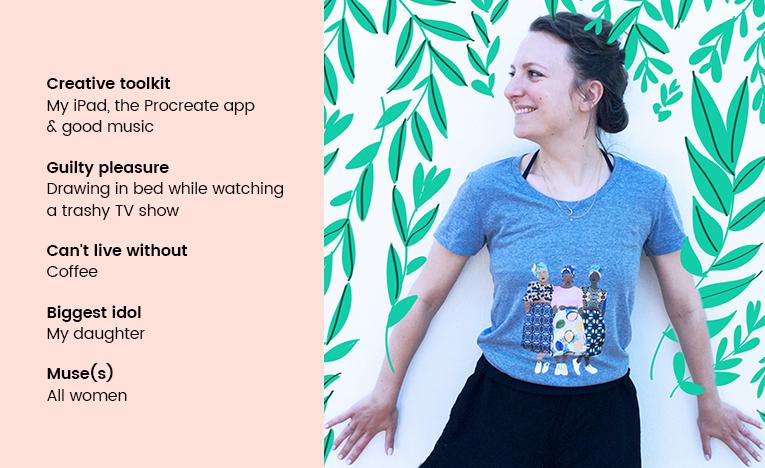
From passionate pastime to full-time profession
Céleste took up drawing at a young age. Reminiscing about her childhood with a sense of fondness, she recalls all the endless hours she spent creating cartoons over the years. Upon graduating from high school, Céleste pursued a degree in visual communications in Lille, followed by a further degree in graphic design in Brussels. As luck would have it, she was shortly thereafter offered an opportunity to work as a textile designer for a small brand in Paris, which she promptly accepted.
Today, Céleste splits her time between her work with fabric and her work as a freelance illustrator and graphic designer, all the while juggling the responsibilities of a new mother. Home is a small apartment in Paris just around the corner from the lively Place de la Bastille, where she lives with her 18-month-old daughter and boyfriend. For the most part, her free time is spent indulging in life’s simple pleasures, such as tinkling with the keys of her piano, reading bedtime stories to her daughter, taking a stroll through the Botanical Gardens, or sipping a glass of wine on her terrace. Just as in her personal life, a sense of her joie de vivre shines through her body of work.
An homage to all women
There is something all-encompassing about the women in Céleste’s compositions. The simple lines that give shape to their features are distinct enough to transmit facial expressions, yet subtle enough to uphold their anonymity. As a result, regardless of their skin tone, hair colour, or physique, we can all identify traces of ourselves within their faces. Céleste elaborates on her intentions, “I would like my viewers to feel good, to find themselves within my illustrations. And if not that, then for my work to take them somewhere in their minds. And let them smile because it’s beautiful when people smile.”
In our eyes, the distinctly relatable nature of her characters is also rooted in their posture—some stand tall as if to march, others lean on each other for support, the next are candidly laissez-faire. And yet, whether they are depicted by themselves or in a group, the women in all her illustrations emanate sisterhood: they never stand alone.
Eager to learn more about the women they personify, we dug a little deeper. “The women in my illustrations are the women of today; proud of who they are and what they represent, proud of their origins and the people they love. I like the idea of representing women who take responsibility for who they are and what they want; women who can be both feminist and feminine; women who work out but also like to go on vacation. In short, free women. In all honesty, I am inspired by many women, whether they’re women who found organisations to help others, highly talented illustrators, or women in power who use their intelligence to instigate change. On an everyday basis, my own daughter is the woman inspires me most. I try to educate her as best I can to be open-minded towards others, to be confident in herself, and to be proud to be a woman.”
Power to the process
Céleste often relies on the online sphere when searching for ideas for new motifs. “I’ll come across an image that appeals to me on Instagram or Pinterest, and that makes me want to illustrate it. It’ll often get stuck in my head, so I whip up my iPad, turn up my music, and draw. My favourite part of the process is colourisation because that’s when I start to see what my final illustration will look like. I often end up doing a lot of colour variations, and before I know it, I’ll find myself with the same illustration in different colours, and I can’t decide which is my favourite [laughs].”
While bold primary colours dominate many of her designs, Céleste reveals that she is particularly fond of unusual colour pairings, such as delicate pinks with bold reds. Hence, soft pastels and silky skin tones flow through the bulk of her pictures.
Thoughts on femininity, empowerment and equality...
To allow us to fully grasp the motivations from which her artworks stem, Céleste was happy to contextualise her ideals. “To me, these are some of the most important words in modern society. Empowerment is critical for gender equality to become the norm. I think it’s crucial to recognise that, while women and men are different in many ways, we all deserve to have the same rights, the same salaries, the same sense of self-perception. Women should be able to take maternity leave without losing their job or standing in the company, just as men should be able to take paternity leave without being singled out. Likewise, women should be able to dress the way they want without being scrutinised. Yes, women are inherently feminine, but so are men. I believe that it’s vital that the word ‘femininity’ stops being perceived as something negative, but that it’s seen as a word that’s full of strength, power and life."
“In my eyes, one of the biggest challenges that women are still faced with in modern society is the interference with their freedom, regardless of whether it’s behind closed doors or in plain sight. Even in this day and age, women around the world are still being held back from being who they want to be. They are still being inhibited from dressing the way they want and often still forced to cater to men’s wishes and needs.”
She also highlights ‘critique’ as one of the main issues that continues to prevail in the fight for equality. “Either we’re considered to be too confined or too free; too feminine or not feminine enough; too maternal or not maternal. And then, finally, we’re chastised for either working too much or choosing to be housewives. In short, we’re still fighting daily. If I could, I would tell all girls in the world to support each other: show solidarity, don’t judge each other, we all need each other. And then, just trust yourself.” We couldn’t agree more.
In the upcoming year, she hopes to expand her freelance work even further. She is currently working hard at designing her “dream life”, in other words, doing what she wants, managing her own time and being her own boss. And we’re keeping our fingers crossed, that she succeeds in all her aspirations.
On behalf of all women: Merci, Céleste.
Interview: Maia Frazier
